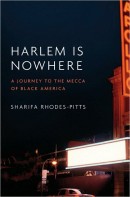 Rhodes-Pitts grew up in Texas and attended Harvard, but her mind growing up was often in Harlem. Her book takes its title from an essay by Ralph Ellison, and in it she mixes her personal feelings about and experiences in the neighborhood with its history, including its appearances in literature.
Rhodes-Pitts grew up in Texas and attended Harvard, but her mind growing up was often in Harlem. Her book takes its title from an essay by Ralph Ellison, and in it she mixes her personal feelings about and experiences in the neighborhood with its history, including its appearances in literature.
In her first New Books column for Harper’s (available online to subscribers only), Zadie Smith leads off with Harlem is Nowhere:
We realize how much the idea of Harlem has meant to Rhodes-Pitts, and what a romantic vision of a writer’s business she has: a magpie with a notebook, who collects everything, and always shows her workings — leading to many scenes set in the library. Although this technique of authorial transparency grows long in the tooth — a classic of the genre is A Room of One’s Own — it still has its intimate pleasures. Like Woolf, Rhodes-Pitts is bookish and devoted, interested in everyday matters: how people walk and talk, dress, go about their day.
At the Barnes & Noble Review, Adam Bradley writes, “Channeling Ellison — but also Langston Hughes, Zora Neale Hurston, and many others, familiar and not — Rhodes-Pitts crafts a compelling narrative voice that is bracingly intimate yet capable of dilating to encompass a chorus of voices and opinions not her own.”
Dwight Garner in the New York Times says, “Ms. Rhodes-Pitts drops us inside her wide-scanning cranium as she searches for her own version of Harlem, one she strains to see through all the graceful and angry words that have already been written about it.” Like other critics, Garner thinks the book lacks focus, and he finds the chorus of voices mentioned by Bradley a bit less satisfying, but he says Rhodes-Pitts is a talent to watch: “At the end you may decide, as I did, that this ambitious racket is somewhat hollow: the book never coheres or locates its own beating heart. But Ms. Rhodes-Pitts’ is a voice you’ll want to hear again, to recapture the scratchy buzz she’s put into your head.”
Smith says the book is less about history, finally, than about all those trips to the library: “Certain key historical facts, surely useful to the general reader, become afterthoughts . . . But once you abandon wanting to know anything very precise about historical Harlem, this is a lovely book about the romance — and dangers — of bibliophily.”
Harlem is Nowhere by Sharifa Rhodes-Pitts
Little, Brown, 304 pp., $24.99

